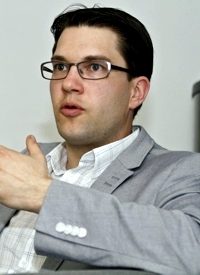
When Swedes went to the polls late last month for the parliamentary election, most of them did not suspect the anti-immigrant “far-right” Sweden Democrats (SD) had much of a chance, especially after the party was banned from advertising in certain subsidized media outlets and generally ostracized and demonized as racists by mainstream society.
But despite the 10,000-strong anti-SD protest that erupted in downtown Stockholm when the final vote count was announced, the election proved that the nationalist party had enough support for its biggest victory yet. It won seats in municipal and county councils across the nation. And it now holds 20 seats in parliament (Riksdag) after receiving almost six percent of the vote nationwide. This election marks the first time SD has ever been represented in the national legislature.
“We have in many ways been treated as anything but a political party in this election,” said SD leader Jimmie Åkesson. “Even so, it was a fantastic result. The situation is a bit uncertain just now, but we have four years ahead of us to speak out on the issues that matter to us and influence Swedish politics.”
Ironically, the party has also become something of a “king maker,” holding what could be the balance of power in local governments across Sweden and even in parliament. News reports were even speculating last week that the party could be the swing vote in the selection of a parliamentary speaker.
The four-party “center-right” Alliance, led by Prime Minister Fredrik Reinfeldt of the New Moderates, was generally considered the winner of the election. But it did not secure enough seats to form a majority government, garnering about 49.5 percent of the vote, or 173 of 349 parliamentary seats.
“They have governed successfully as far as economic policies are concerned,” Stockholm University political science professor Olof Ruin told NTDTV. “Evidently Fredrik Reinfeldt, the conservatives, also have given confidence to people.” The election result was generally seen as a vote for tax cuts and fiscally conservative policies.
The leftist minority alliance — composed of the green party, the Social Democrats, and the left party — held on to 156 seats. That means neither coalition has the votes to govern. But Reinfeldt has already said that his alliance would not work with SD, reaching out instead to the green party, which refused to get on board. And so, chaos still reigns as neither side has enough seats to govern without the cooperation of SD or the opposing coalition.
The biggest loser in the election, despite winning the highest percentage of the vote, was the Social Democrat party. It received its lowest share of the vote in almost a century after governing Sweden almost uninterruptedly for more than seven decades. Recent elections, however, have seen a surge in votes for what in Sweden passes as “right of center.”
While the world media consistently refers to the Sweden Democrats as a “far right” party because of its strict stance on immigration — it wants to reduce immigration by up to 90 percent and start encouraging refugees to go back to their home countries — the reality is more complex. The party generally supports the massive Swedish welfare state, as long as it is used for Swedes. It is also an advocate of “social justice,” a broad term normally referring to wealth redistribution and increased state control over the economy. But, it also claims to support traditional family values.
SD also supports the United Nations’ Universal Declaration of Human Rights (or privileges and obligations, depending on your point of view), and claims to be opposed to all forms of totalitarianism. It also wants to renegotiate Sweden’s membership in the European Union. And so, the party frequently points out that it does not fall easily within the traditional “right vs. left” political spectrum.
Almost 20 years ago, another anti-immigrant political party entered parliament in Sweden. But unlike the SD, the “New Democracy” party was strongly pro-free-market policies and advocated shrinking government and privatizing state-owned industries. After one term in office, marginalized by the major coalitions and parties, New Democracy failed to get enough votes to be represented in parliament again.
And now, SD could find itself in a similar position. Talk has been surfacing in the media of forming an “anti-party” to neutralize the SD in parliament. The idea would be to assign 20 parliamentarians from various parties to the “anti-party” so they could always vote against the 20 SD seats. Whether this will happen remains to be seen.
But according to analysts, Sweden seems to be moving in a positive direction overall in terms of cutting back on government spending, reducing taxes, and allowing the market to work more freely. But the “center-right” coalition has also passed some laws which have caused an uproar among people concerned with freedom and human rights — for example, earlier this year, under Reinfeldt’s leadership, parliament passed an “education” act that essentially banned home schooling and religious instruction at private schools.
Some observers see the Swedish election results as part of a broader trend. “This unexpected Swedish victory is just the latest in an unprecedented run of success worldwide for fiscally conservative parties, beginning after the Greek debt crisis in April,” wrote Henry Olsen, the National Research Initiative director at the American Enterprise Institute. “Since then, there have been eight elections in the developed world, six of which have been won by the right.”
Leftists and right wingers alike have proclaimed the end of the Swedish-model bureaucratic “nanny state.” However, unless Reinfeldt and his alliance — along with their newly elected right-of-center counterparts in other European countries — show true leadership and implement much-needed reforms to the best of their ability, the “victory” could be short-lived. But for a country that used to have government-run fast food restaurants, Sweden is certainly making progress.
Photo: In this photo taken May 24, 2010, Sweden Democrats party leader Jimmie Akesson speaks during an interview in Stockholm, Sweden: AP Images



